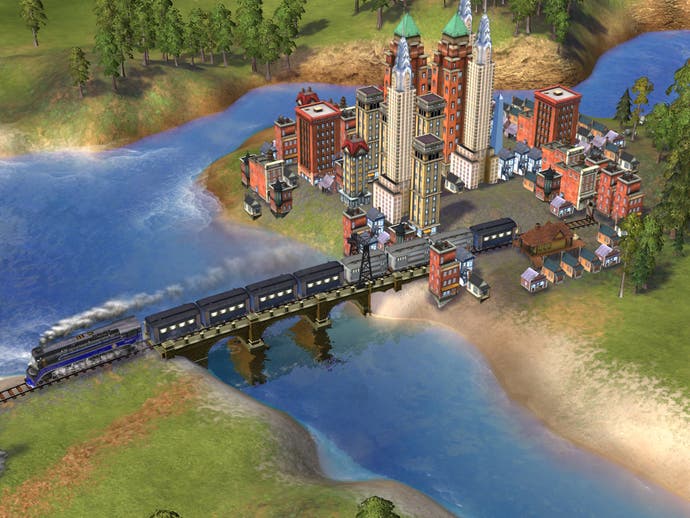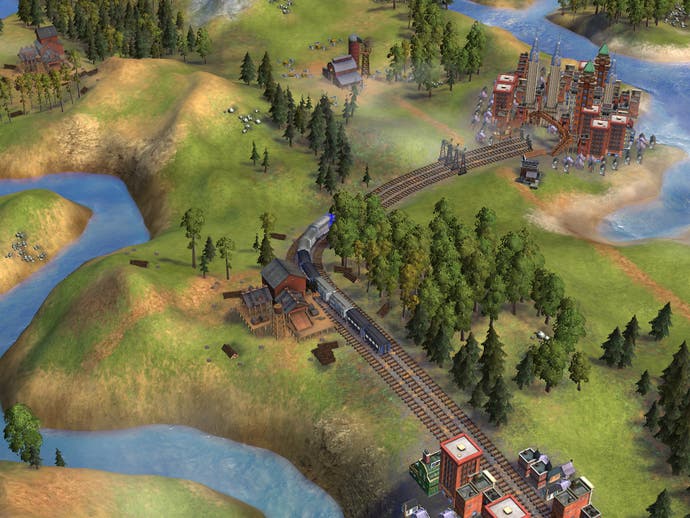Sid Meier's Railroads!
Choo on this.
Or Railroad Tycoon 4, as it's definitely not going to be called. Yes, it's that train network management time again, complete with industrious-sounding theme music and lots of options to click as you watch your virtual wallet grow satisfyingly fat, or despairingly thin. The huffing steam engines and whirring diesels are almost inconsequential to the overall puzzle-tweak-challenge of connecting supply with demand and making the world go round. It's management at its most genial: connect A with B in the most efficient manner possible and personal satisfaction arrives in droves. Or at least that's the idea.
Choo-choo!
Meier's latest platform game is sort of unremarkably entrancing. We expected it to be enjoyable, if simply because the Railroad games are some of the best-crafted management games in the world, but we could have done with something a little more muscular. As the game unfolds it feels entirely intuitive, with everything in its place (even if the interface is a bit too dinky). The friendlier, cuter approach we had been previewed previously makes this an altogether more playful experience than other Tycoon games and those folks who spent hours nuzzling the stats pages of Railroad Tycoon 3 will likely find this more like a rummage around the toy box than a serious outing to the land of computerised Hornby.
Once you've digested the basics of how to connect outlying resources to cities, as well as how to bend your train-tracks across the topography of the cute little maps, you start to reel in cash and begin the long process of buying out your opponents. Of course you could play the single-player on your own to make it all disgustingly easy (yet mildly satisfying) to monopolise to your heart's content. As long as you're not too profligate you can run a profitable little network with no trouble and watching the goods get delivered has its own kind of satisfying mental clunk-click. Yeah, it's possible to spiral into debt and doom yourself, but you'll soon know not to overload trains, and learn to watch out for the more inefficient services before the wallet goes boom.

However, it's only when you compete against AI or human players that there's any real action. At this point it becomes about acutely competitive management, trying to out-build and out-bid (for access to new technologies) the other tycoons as you squeeze every last penny from your operation. Get enough cash and you can buy your rivals out, forcing a monopoly against the odds. Aggressive capitalism - that's the real goal of the game.
At this point you begin to realise that there's not that much more depth than there was in the tutorial, there's simply more efficiency. You need to run fewer trains and get them to do more. You need to put exactly the right amount of track down to make sure trains aren't sitting about idly waiting for space to come free. Getting large, circular routes where a single train can perform numerous tasks is far better than my default setting which is a broken spider-web of connections, dubiously hooking up anything within range. Of course the maps also splatter resources unevenly across their terrain, so while you might need fish for your city, the fishing port might be a long way off. Getting to fish means finding efficient uses for that long loop of track between here and there, and any new additions must not cause too much delay to already profitable projects. Trains cost money for every moment they are on the track, so delays mean big holes in your wallet. With that in mind it might have been useful for the game to have some way of telling you how and why a hold-up occurs, which it often does.
I've seen a few people complain that the maps aren't big enough, and they're partially right. Nevertheless, once you've got a really busy network going there's more than enough going on to your swamp your attention. You feel like you should be delegating tasks to lesser players so that you can concentrate on the grand strategy. Of course that's what it feels like, until you realise that there really isn't a grand strategy. Railroads has remarkably limited ambitions and once I understood how it worked I lost all impetus to make it work. There's just nothing much to aim for, especially since there's just a bunch of scenarios and no campaign sequence of any kind. Ultimately I get the impression that the game was designed as a multiplayer experience, with two to four people playing against each other over the course of a couple of hours. Without that element of human competition I can't see how anyone would stay hooked. Out-performing the (really pretty impressive) AI just isn't enough.

Yet to say it's lacking depth doesn't mean it's any less engrossing than the best Tycoon games. You'll get inexorably drawn into the process of running your network, connecting the cities, farms and mines, all the while selecting just the right tiny locomotives to deliver your payload of miniscule cows to the correct destination. It's clockwork, and you want to find out how it works. But beyond that it's not altogether satisfying. There's nothing that really excites. No larger aspiration or long-distance goal. It's like a well-made lawnmower. It really mows that lawn... but yeah, that's all it does.
Perhaps a bigger flaw, at least on the version I've played, is what an astonishing system-hog it is. Even on my silicon equivalent of steroidal strongman those trains really chug, even with settings set low. It wasn't unplayable, but I wouldn't like to have attempted it on my old Pentium 4.
So then: Railroads(!) is enjoyable, but perhaps another instance of the 'reviewer's trance'. That's the mildly hypnotic effect that seems to take over when games aren't dull enough to be boring but aren't exciting enough to cause any kind of, erm, arousal.
Choo-choo!








